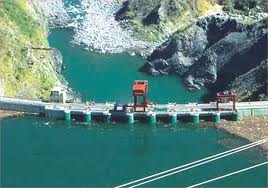RIVER LINKING: India plans to go ahead ignoring promise
India on Monday unilaterally announced its decision to implement the controversial plan to interlink Manas, Sankosh, Teesta and Ganges, four trans-boundary rivers, oblivious of the promises it made to Bangladesh.
It would be the Himalayan component of India’s controversial river interlinking plan that envisages construction of storage reservoirs on the main Ganges and the Brahmaputra rivers and their principal tributaries to use the flows for irrigation and hydro electricity generation.
The project is part of interlinking 30 rivers conceived during the tenure of Indian prime minister Atal Bihari Vajpayee who led the BJP led NDA coalition government from 1999-2004.
India calls the other part of the interlinking project as its peninsular component.
India’s interlinking the Himalayan rivers would leave Bangladesh dry, said water experts.
On Monday, Indian state minister for water resources Sanwar Lal Jat announced the controversial decision at a meeting of the special committee for interlinking of rivers in Delhi, reports the Times of India.
Updating the committee on the status of the projects for interlining rivers, he said, ‘I hope with all statutory clearance, we will be able to start the actual execution of work on the project by the end of this year.’
Sanwar said that the government of India would soon approach Assam, West Bengal and Bihar to seek their consent for interlinking Manas, Sankosh, Teesta and the Ganges rivers.
Water expert, Ainun Nishat, described the Indian decision as ‘unfortunate, unjust and unilateral.’
New Delhi unilaterally announced the decision to interlink the trans boundary rivers contrary to the repeated assurances given to Bangladesh by Indian prime ministers, Nishat told New Age.
‘It’s not a technical but a political decision to interlink the trans boundary rivers,’ he said.
The issue of sharing the waters of the common rivers should be resolved first politically,’ said Nishat, former Brac University vice chancellor.
Manas is the largest river system of Bhutan and its basin countries also include China and India.
The main tributaries of the Manas originate on the north of the Himalayas.
The Manas flows through Bhutan for 272 km and then through Assam for 104km before it becomes a tributary of the Brahmaputra.
Sankosh rises in northern Bhutan and empties into the Brahmaputra in Assam.
Nishat said India should involve the other basin countries before interlinking Manas and Sankoshi.
Bangladesh is not aware of any Indian move to interlink the rivers, water resources ministry secretary Zafar Ahmed Khan said Wednesday.
Bangladesh repeatedly requested India not to take any project on the common rivers without its consent, he said.
He told New Age that that the issue would be taken up through the diplomatic channel to know about the reported river-linking project and do everything necessary to protect the interests of Bangladesh.
Joint Rivers Commission officials said India did not inform Bangladesh about its move to inter link the four trans boundary rivers to withdraw their waters from the upstream.
‘India made repeated pledges to Bangladesh that it would not to proceed with Himalayan component of the interlinking project without taking the neighbours onboard, they said.
‘We don’t understand what prompted them to proceed unilaterally,’ they said.
If implemented, India’s river-linking would hit hard the ecology of lower riparian Bangladesh and the livelihoods of its people, said water experts.
Delhi’s sudden announcement of the unilateral decision was bound further affect India’s credibility as a neighbor said diplomatic observers as the issue of sharing the Teesta waters remained unresolved for decades.
The issue remained unresolved even after the governments of India and Bangladesh had agreed to sign the Teesta waters sharing agreement in January 2011.
The Teesta waters sharing issue has been on the negotiation table since 1954.
In the Joint Declaration issued from the two capitals on June 7 marking the Indian prime minister’s visit to Bangladesh, Narendra Modi reiterated the earlier commitment that India would not take any unilateral decision on the Himalayan component of their River Interlinking Project which may affect Bangladesh’.
The same declaration said, ‘Prime Minister Modi conveyed that deliberations are underway involving all stakeholders with regard to conclusion of the Interim Agreements on sharing of waters of Teesta and Feni as soon as possible’.
It also said, ‘the two Prime Ministers recalled Article-2 of the Framework Agreement on Cooperation for Development of 2011 and reiterated their commitment to address the issue of water resources management of common rivers including water sharing, in a holistic manner through common basin management’.
Bangladesh and India share 54 trans-boundary rivers, but they have a 30-year agreement only to share the Ganges waters.
- See more at: http://newagebd.net/138155/india-decides-to-interlink-trans-boundary-rivers/#sthash.hypycgUu.dpuf











